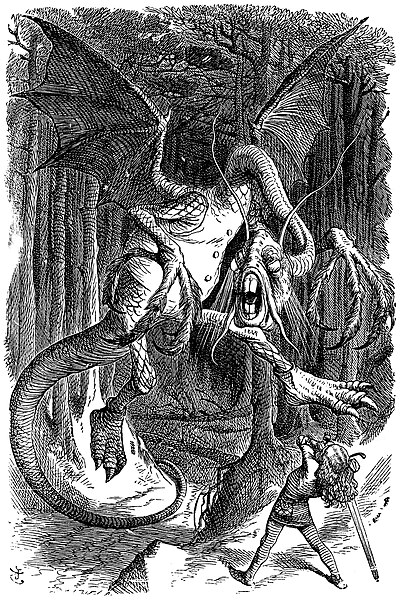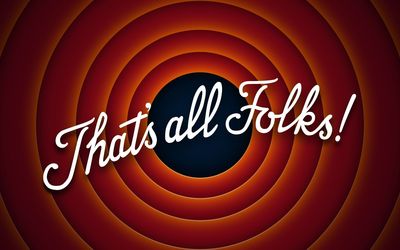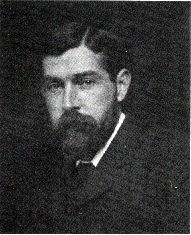The wolf in grammatical clothing
One important concern of philosophy is the question of when one "knows" a proposition, as opposed to merely believing it. But a precondition for knowing a is that the proposition at least be meaningful. So, let us begin by exploring what it means to be meaningful. That exploration begins with Jabberwocky.
Oh the Jabberwock! With teeth that bite and claws that catch. One of the reasons Lewis Carroll's classic poem is so impressive is that we almost feel like we understand it. Take a moment and remind yourself what it's like; it's really quite remarkable. Read "The Jabberwocky" or listen to it spoken in the video below.
Of course we do not understand all the expressions in the poem. But we can comprehend just enough to conjure up images of a fearful Jabberwock, as in John Tenniel's 1871 depiction.

Why do these senseless statements seem meaningful? It is in part because Carroll has formulated expressions that have a correct grammatical form. This gives the illusion of literal meaning even when there is none.
You can see how this is possible by looking at a few examples. Consider the following.
| 1. | The carriage | came rumbling | through | the countryside |
| 2. | Colourless green ideas | sleep | on | furiousness* |
| 3. | The Jabberwock | came whiffling | through | the tulgey wood |
| 4. | The Absolute | enters | into | evolution and progress |
| 5. | The Nothing | is | prior to | the Not and the Negation |
Although the first expression is obviously plain and meaningful English, the second one is designed to be totally meaningless, and the remaining expressions are questionable. Thus, an expression may be a grammatically correct arrangement of words — even correct English words — but this does not necessarily make it meaningful! The grammar can give it the illusion of meaning. Such an expression is like a wolf in grammatical clothing, tempting us to search for meaning where only suffering lies.
Which of the sentences above do you think are meaningful? Think about it for a moment.
The final two expressions are by two well-known philosophers. The first is from Merton Oxonian and idealist F.H. Bradley's (1916) Appearance and Reality: "the Absolute enters into, but is itself incapable of, evolution and progress". The second is from Martin Heidegger's (1929) What is Metaphysics? lecture: "the Nothing is prior to the Not and the Negation".
Are these statements meaningful? Or are they like the Jaberwocky, tempting us to search for meaning where there is none? This question led to one of the great critiques of metaphysics of the 20th century.
The empiricist critique of metaphysics
The empiricist critique of metaphysics is not that philosophers like Bradley and Heidegger are wrong. It is that many of their utterances are complete and utter nonsense. According to the empiricist critique, most of metaphysics is as meaningless as the Jaberwocky or the Colourless Green Ideas.
In fact, metaphysics is worse, because it often purports to be literally meaningful. At the core of this critique is a criterion about what's meaningful and what isn't. Here's what empiricist David Hume said in the final passage of his Enquiry.

"If we take in our hands any volume or divinity or School metaphysics, for instance, let us ask, Does it contain any abstract reasoning concerning quantity or number? No. Does it contain any experimental reasoning concerning matters of fact or existence? No. Commit it then to the flames, for it can contain nothing but sophistry and illusion. (Hume 1748)
This became a popular critique in the 20th century, formulated by many people. One version is the following.
Here is a classic application. Suppose that while lost in thought deep in a basement somewhere, and independent of any observations, a metaphysician makes a claim about how "reality transcends experience." The claim is not a matter of logic or mathematics, but rather proposes some feature of reality that goes beyond our experience. The empiricist responds: what could that possibly mean?

A sentence is only cognitively meaningful if it can be understood by someone. But what is understanding? One view is that understanding consists of making connections between sensory inputs. When you understand the layout of a room, for example, you understand the relations between various kinds of visual input. So, any statement that escapes sensory data will escape all understanding and all meaning. Or so says the verifiability criterion of meaning.
On the other hand, compare the sentence, "I sit in a four-walled room." Your senses immediately confirm whether it is true or false. So, it passes the test of meaningfulness.

The other option is that the philosopher's utterance could be a logical or mathematical truth. Consider the expressions:
All bachelors are unmarried.

Logical and mathematical statements are also meaningful in a certain sense. But from the empiricist perspective, they mainly express consequences of conventions that we have adopted for manipulating words and symbols.
Let us call an expression metaphysical if it purports to express a genuine proposition, but actually expresses neither a logical truth nor an empirically verifiable hypothesis. Occasionally, metaphysicians purport to express non-analytic, non-empirical truths. And when they do, they must contend with the empiricist criterion of meaning.
What counts as verification
The verifiability criterion condemns a huge amount of what people often refer to as philosophy. But to know just how wide the scope is, we must settle a few details as to what counts as verification.
Practical vs In Principle
Pause for a moment and think of something you would like to learn how to do. For me it's playing the accordion. I don't know how to play, but I would really like to learn.

Ok. Now suppose somebody asks me why I'm hoping to learn to play the accordion. One of the reasons I'd be likely to give would be the following.
I would enjoy playing Piazzolla's Four Seasons of Buenos Aires on the accordion.
Is this a meaningful thing to say? I certainly hope so. I just don't have the practical means to verify it at the moment: I don't have an accordion, let alone the capacity to play it. On the other hand, I could in principle verify it, once I've overcome the detail of not knowing how to play.
One can think of many claims that are not practically verifiable: A claim about the mineral composition of a rock on one of Saturn's moons; a claim about a 13km deep hole; a claim about what happens when an elephant is in freefall for over five minutes.

There is a difference between 'practical verifiability' and in 'principle verifiability'. When modern empiricists demand that a meaningful sentence be verifiable, they normally mean in principle: for example, in Oxford empiricist Alfred Ayer's approach.
Strong vs Weak verification
So, verifiability in principle is enough to have a meaningful statement. But how much certainty is needed in a verification? Consider the following sentence.
All ravens are black.
How would one go about verifying that this statement is true or false? One way would be to get out a big book and keep track of every raven we see.

The problem is that no matter how diligently we check, there will always be some ravens that we have not confirmed are black.
This isn't just a problem with ravens, but with many laws of nature.
This is because a law often takes the form of a universal statement like "X is always Y":
"In a perfect market, increased demand for a fixed supply corresponds to an increase in price."
"In a normal kettle at atmospheric pressure, water boils at 100°C."
"Members of distinct species cannot mate and produce fertile offspring."
Like the statement about the ravens, there are simply too many instances of these statements in order to check each one. But this does not mean they have not been verified! On the contrary, most empiricists would agree that they can and have been verified.

Let us call a statement strongly verified if it has been conclusively verified by observation once and for all; call a statement weakly verified if some observation has increased the probability that it is true.
Some statements can surely be strongly verified, such as the statement that I have hair on my head. Others may not ever be strongly verified, such as the statement that all mammals have hair. Fortunately, most empiricists agree that the verifiability criterion only requires weak verifiability. This allows statements like "All ravens are black" to be meaningful, while still rejecting statements like "Colourless green ideas sleep furiously."
Consequences of modern empiricism
Part of what makes modern empiricism such a satisfying view is that it allows one to eliminate many fruitless ideas from discourse. People may be willing to entertain all kinds of crazy conjectures, perhaps far too many. One can even teach a computer to generate random nonsense that may appear to be meaningful at first. Don't believe me? I've implemented an example below! The sentences are automatically generated using javascript, the most common scripting language on the web.
Someone who did not know how these sentences were being produced might be inclined to study them. What a poor soul that would be! But the modern empiricist escapes this fate, since the sentences are (almost) entirely unverifiable.
In those cases the choice was easy. But modern empiricism is also ruthless, cutting down enormous swathes of traditional philosophy. Here is a brief sampling of a few of its victims.
Table of unverifiable casualties
| "Reason is substance, as well as infinite power, its own infinite material underlying all the natural and spiritual life; as also the infinite form, that which sets the material in motion." — G.W.F. Hegel |
| "What is to be investigated is being only and — nothing else; being alone and further — nothing; solely being, and beyond being-nothing. What about this Nothing? ... Does the Nothing exist only because the Not, i.e. the Negation, exists? Or is it the other way around? Does Negation and the Not exist only because the Nothing exists? ... We assert: the Nothing is prior to the Not and the Negation.... Where do we seek the Nothing? How do we find the Nothing.... We know the Nothing.... Anxiety reveals the Nothing.... That for which and because of which we were anxious, was 'really' — nothing. Indeed: the Nothing itself — as such — was present.... What about this Nothing? — The Nothing itself nothings." — M. Heidegger |
| "the Absolute enters into, but is itself incapable of, evolution and progress" — F. H. Bradley. |
| "The space of reasons does not extend further than the space of concepts, to take in a bare reception of the Given." — John McDowell, Mind and World |
| The world of sense-experience is unreal. (Cartesian skepticism) |
| There are elements of reality that transcend experience. (Transcendentalism) |
| The world consists fundamentally in only one substance. (Monism) |
| The unobservable aspects of science are true/real. (Scientific realism) |
| There is an omniscient and all powerful being that exists outside the realm of what our senses can detect. (Theism) |
| The ultimate foundation of reality is mental. (Idealism) |
| "Without [our values], we wouldn’t be able to walk down the street freely, to say what we think, to be who we are, or do what we want." — David Cameron, "British Values" |
This list includes many traditional philosophers, as well as some modern philosophers and politicians. According to modern empiricism, these statements are not even false. They are meaningless because they aim to describe a reality that transcends the senses. As the Oxford empiricist A.J. Ayer eloquently put it, "the labours of those who have striven to describe such a reality have all been devoted to the production of nonsense".
Does this mean that there is no more room for philosophy?

Empiricism does not imply there is no place for philosophy: far from it. It says that there is no place for metaphysics. So long as philosophers remains concerned with the logical and mathematical analysis of empirically verifiable statements, their work is perfectly acceptable by the lights of modern empiricism.
Concerns about modern empiricism
Like most such forceful views, modern empiricism has its critics. As you can imagine, the metaphysicians tend not to be too keen. But most critiques of modern empiricism tend to follow one of four main worries.
1. It's hard to make "verifiable" precise and meaningful.
It's never really been made perfectly precise when something is verifiable. And it's seemingly easy to come up with examples in which it fails to successfully prohibit wonky metaphysics. Consider the following disjunction.
Water boils at 100°C OR The Nothing is prior to the Not.
This expression appears to be perfectly verifiable, since we can verify the first disjunct without a problem. Unfortunately some wonky Heidegger has managed to slip into the sentence as a whole. How can we keep out the silliness while retaining the science?
Today, the precise definition of verifiable has been extensively explored by philosophers, in an area of philosophy of science called confirmation theory. The matter is far from settled and there are many open problems. However, it is also a fruitful and productive area of philosophy, which we will think about more in later sections.
Another concern is about how we know that the verifiability criterion is actually correct. After all, it must be either logical or verifiable on pain of being itself meaningless and undermining the entire programme!
A.J. Ayer and others have argued that the principle is a matter of logic, and this is how I have presented it here. Part of what is meant by "meaning" is that "understanding" occurs, and part of what is meant by "understanding" is that an expression is either logical or verifiable by the senses. However, this claim has been disputed.
2. The "holistic" character of science is hard to describe.
The French physicist Pierre Duhem and later the American philosopher W.V.O. Quine both argued that science is holistic, in that it cannot be considered as a set of isolated propositions to be verified. They used the metaphor of a web, in which the most important propositions of science were at the centre, and the less important ones out at the edges. Perhaps the modern expression of this metaphor is in terms of citation networks.

For example, when it was discovered that Newton's theory did not perfectly predict the orbit of Uranus, the central laws were not rejected, even though they seemed to have been technically falsified. Rather, it was suggested that there must be a hidden additional planet that was perturbing the orbit. That planet turned out to be Neptune.
In Quinean language, Newton's laws were closer to the center of the web and so were not so easily discarded.
Empiricists have shared this picture of science since long before Quine, and so it is not clear why it was viewed as such a difficulty for them. Indeed, much of modern confirmation theory deals with such puzzles. However, their status remains a matter of debate.
3. It prohibits historical and sociological approaches to philosophy.
A popular view about science championed by Kuhn is that its truth is historically and sociologically relative. (More on this in the next lecture!) Most empiricists today respond to this criticism by digging in their heels. The modern empiricist approach to philosophy of science tries to aim at matters that go beyond historical and social relativism.
History of Modern Empiricism
Modern empiricism was referred to as logical positivism and later logical empiricism when it was developed in the early 20th century. Many of its original developers were young scientists, reacting to the heavily metaphysical doses of idealism that had become popular in the 19th century. It was extremely influential in the development of 20th century philsoophy.
Although empiricism fell out of fashion for many years following the criticisms of W.V.O. Quine, it remains popular in many philosophy of science circles, although with less emphasis on logic and greater interest in mathematics more broadly as applied to scientific and philosophical problems.
You can read more about the history in many places, such as in Godfrey-Smith's chapter on "Logic plus Empiricism". But one of the best places to learn about modern empiricism is from one of its founders, British philosopher A.J. Ayer.
Here he is.
What you should know
- How grammatical form can give the illusion of meaning
- What the verifiability criterion of meaning is, and how the empiricists used it in a critique of metaphysics
- What a modern empiricist means by the a "metaphysical statement"
- The difference between partial/in principle and strong/weak verification.
- Some consequences of modern empiricism for traditional philosophy.
- Three critiques of modern empiricism.

